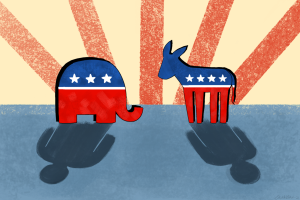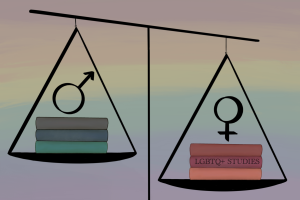Friendship goes farther than a business card
April 2, 2023
Carefully crafted questions, equally rehearsed answers. Polished heels, suits and ties. “Network, network, network:” this is what students are told will lift them up the professional ladder.
“Sell yourself,” we hear, clamoring at the dreaded corporate rungs.
It’s true that networking, which is interacting with others to exchange information and develop professional connections, can lead to career opportunities and success. However, there’s a point when interactions lose their meaning. Building authentic connections with people around shared passions most always surpasses a mindless business card swap.
“There’s a balance in networking,” Hunter Bezner, UT alum and judicial clerk for the Supreme Court of Texas said. “It’s a lot about being intentional: meeting people, reaching out to people and staying on people’s radar. As a balance, we’re trying to be genuine and not just have weird interactions.”
If professional and personal balance is lost in networking, interactions can become robotic. When we leave humanity out of our relationships, we contradict the values of networking: getting to know others personally and learning from their experiences.
Bezner reflected on one of his law school professors who kept an Excel spreadsheet of social contacts and annually emailed portions of his list.
“I just hated the sound of it,” Bezner said. “There was something strange and very mechanical about it.”
Bezner said there is a better solution: send your colleagues Christmas cards or share articles that reflect their interests.
“That’s a great way to have a natural ‘this reminded me of you’ interaction that is better than just having a calendar reminder to email someone,” Bezner said.
Still, for many students pressured to network everyday, the belief that connections form naturally and independently of forced networking can be a difficult one to accept.
“I feel like it’s a weird pressure that you feel uncomfortable with,” sociology freshman Nanaafiia Adjei said. “Like, (they say) ‘come to this networking event’… but am I truly getting anything out of it when there’s 20 students running to one person?”
Bezner’s point just adds to an often-forgotten reality: while who you know can help you do great things, a genuine dedication to what you do influences your network equally.
“At the end of the day, you’re never gonna get work if you’re bad at it. Certainly doing good work, especially early on, is going to boost people’s perception of you and make you look more reliable to them than anything else,” Bezner said.
Personally, I often feel awkward during networking events and leave dissatisfied; in contrast, my best mentors and career opportunities began as friendships based on mutual interest. Somewhat paradoxically, the best networking involves avoiding traditional networking in favor of plain, unscripted socialization.
“I think with networking today, we should be more focused on cultivating good relationships with the people first before we expect to gain something out of them,” Adjei said.
For students who have been intimidated by the pressure to network, this sentiment should come as a relief. Our connections are more authentic — and therefore more valuable — when we relax a little and focus on being friendly, generous people.
Jackson is a Plan II and journalism freshman from Boerne, Texas.
















